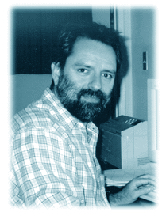Jose Moya
Biography
Raised in socialist Cuba, Jose was sent to Franco’s Spain at the age of fourteen and came to the bastion of liberal capitalism a year later, receiving what he facetiously calls an existential education on the three main political systems of the 20th century. A decade of working in sundry jobs that went from truck driver to janitor expanded this informal training. These experiences engendered in him, first, a fancy for ideological rhetoric and debates, and later a desire to understand how people respond and adapt to large historical forces and shifts that seem beyond their control. His research and teaching reflect this interest and a general curiosity about the veiled realities that seem to exist under official discourses and structures everywhere. He thus remains an unrepentant sociocultural historian unstirred by the renewed interest in politics and elite intellectual history in the trade.
After receiving his Ph.D. from Rutgers University in 1988, he came to UCLA. Here he has taught undergraduate courses on Latin American history, U.S. immigration, family history, cities in the Americas, and anarchism in the Western Hemisphere and Europe. He has also directed nine Ph.D. dissertations and is currently mentoring another twelve [irreverent] apostles.
His recent book Cousins and Strangers: Spanish Immigrants in Buenos Aires, 1850-1930 (Berkeley: UC Press, 1998) has been widely acclaimed (and, of course, unfairly attacked) in over forty reviews appearing in journals in a dozen different countries. This book won five prestigious awards and the journal Historical Methods (Winter, 2001) published a forum discussing its theoretical and methodological contributions to the field of migration studies in general.
Jose is currently working on a social, cultural, and intellectual history of anarchism in belle époque Buenos Aires. This movement represented the most vital working-class, and bohemian, ideology during the period; and Buenos Aires was its most important center in the world after Barcelona and, perhaps, Paris. This project has earned grants from the Fulbright Commission, the Fundación Antorchas, the National Endowment for the Humanities, the UC President Research Fellowship in the Humanities, and the American Council of Learned Societies’s Burkhardt fellowship, one of the eleven granted in the entire country in all disciplines and fields in the social sciences and humanities.
He also began to work on a sociocultural history of May Day (the international labor day, not the maypole spring festivity) in New York, Buenos Aires, London, Paris, and Barcelona, which he optimistically plans to finish before mid-century. When he is not working to reach this goal, he enjoys classical European music, modern art, artsy films, chess, and fine wines (if he is in elitist-mode) and salsa dancing, baseball, and beer otherwise.


